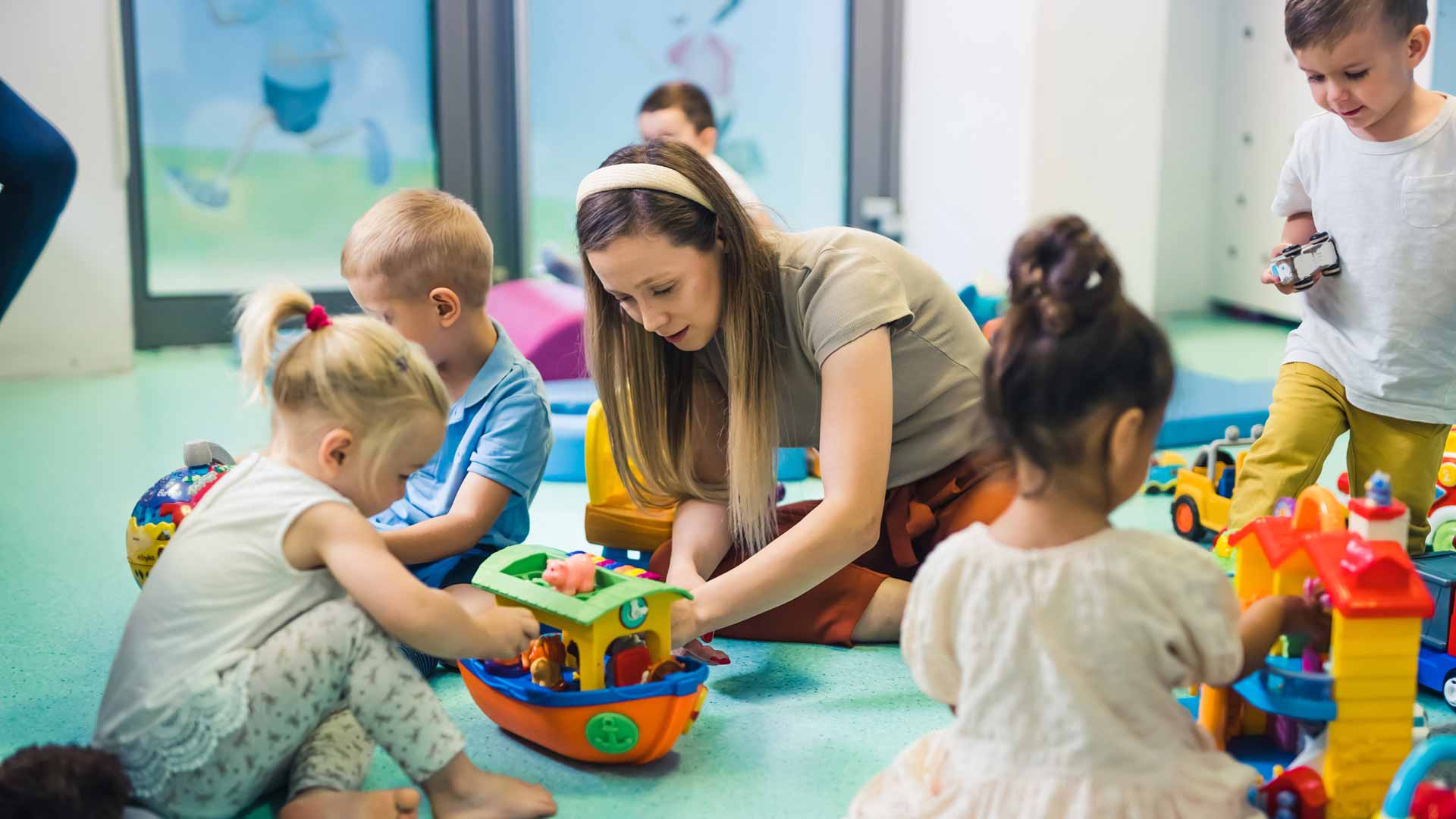
If you are planning to move to France with your children, know that you will have multiple childcare options. Whether you prefer a regular daycare centre, to have a nanny at home or even an occasional babysitter, the variety of childcare options make Paris Region an ideal region to live with children and pursue one’s career. Parents can rest assured. Their children will enjoy the region as much as they will.
A Wide Range of Childcare Options
France has a variety of childcare options for children from 3 months to 3 years old. This is because maternity leave is relatively shorter than in other European countries and women tend to go back to work on average 3 months after giving birth. The French social security system is one of the most generous in Europe in terms of childcare allowances and benefits and tailored to support parents.
As a rule, parents in France tend to opt for one of the following childcare options: either they put their child in a day-care center called “Crèche” (which can be public or private) or they employ a childminder, commonly referred to as “Assistante Maternelle”, and which refers to a person who looks after the children in their own home or in yours.
Collective childcare facilities («crèches»)
- Public daycare centers
They welcome children from 2.5 months to 3 years old during working hours and are managed by the local city councils. You must apply through your local town hall (“Mairie”) which will ask you for proof of address. Applications for September should generally be made before April/May. Please note that places are limited and waiting lists may be long.
-
Compagny crèches (“crèches inter-entreprises")
Compagny crèches are private daycare centers in which spots must be booked directly by companies for their employees. Spots are co-financed by parents, the CAF “Caisses d'allocations familiales” - the French family benefit fund - and companies. In return companies benefit from tax reductions, they can deduct 83% of the costs incurred through family tax credit and corporate tax savings.Among the largest daycare groups, you will find the following: Maison Bleue, Babilou, Les Petits Chaperons Rouges, etc. Some of them are bilingual: People&Baby, Little Frogs, Crèches Plumes, Les Petites Canailles,...If you work in Paris Region, ask your employer if they provide such support.
Service providers can also put companies and families in touch with daycare centers. For example, Les Parents Zens supports companies of all sizes in setting up customized parenting projects: reservation of daycare places, emergency childcare, homework support, etc.
- Micro-crèches
These are private, smaller crèches that can accommodate up to 10 children from 2.5 months to 3 years old. Some micro-crèches are company crèches. Ask your employer if you are entitled to a spot. The advantage of this structure is that, in smaller numbers, the children evolve in a mixed ages environment: babies and toddlers experience “community life” and help each other during activities and meals, for example.
- Haltes-garderies
This is a “drop-in daycare service” and is more flexible than a daycare center. Haltes-garderies can accommodate children from 2.5 months up to 6 years old on an occasional basis. The drop-in daycare center can be a complement to the child's usual care routine so that the child can benefit from the interaction with a group of other children.
- Parental crèches (“crèches parentales”)
They are managed by parent associations who hire childminders and supervise the children themselves. You can find a list of these crèches on www.monenfant.fr – a website managed by the CAF to support families in their daily lives - or on the website of your City council (watch out for the section called “Petite enfance”).
As well as enabling you to spend more time with your child, this type of childcare also offers greater flexibility than a collective daycare center.
Nannies or Childminders
- Childminders
A certified childminder (Assistante maternelle or crèche familiale in French) looks after 1 to 4 children. Childminders have certifications allowing them to supervise children in their own homes, but they can also work at a daycare center called Maison d’Assistants Maternels (MAM). To find a certified childminder, consult the list of certified childminders on www.monenfant.fr or visit the website of your City council (section “Petite enfance”). You can get a list of registered childminders to contact directly.
- Employing a childminder at home
In France, it is possible to hire a childminder or nanny that will look after children in your own home (“Garde à domicile” in French) or to opt for sharing childcare with another family (“Garde partagée” in French). The family acts as employer or co-employer of the home-based childminder.
If you are looking for multilingual childminders, check out the following website: Kinougarde, Momji (English-speaking babysitters), Nounou-Top or Maminou.
Additional options that could be worth exploring
- Childminder Agencies
The family can also go through a childminder agency to find a professional childminder to look after their children and/or to recruit a professional childminder and manage the paperwork for them. When employing a childminder at home, the family is the employer, or the co-employer (in the case of shared childcare) and oversees the recruitment process including the formalities of drawing the employment contract, paying the employee, and abiding by labor regulations and the national collective agreement for employees of household employers. In this instance, you can use websites like Pajemploi that issues pay slips on behalf of the employers, and create an account on Pôle Emploi to find employees as a household employer.
- Shared childcare
If you are interested in sharing childcare, check the following:
- Free classified websites: Craigslist Paris, Bebe Nounou, Nounou Top
- Facebook groups focused on daily life in your town or expats groups (Expats in Paris, English Speaking Mums/Moms living in Paris, etc.)
- Contact your City council
- Contact childminder agencies such as Be My Nounou
- Hosting an au pair
The au pair is a young person between 18 and 30 years old, of foreign nationality, who comes to France to study and improve his or her language skills for a period of 3 months to 1 year. He/she will be accommodated in your home and will be able to look after your children (5 hours/day max.). In return, they will have their own room, meals, transport, pocket money, and one day off per week.
As a host family, you will have to pay the employer's contributions. Specialized agencies will be able to help you find the perfect match. - Meeting other parents with young children
Many municipalities have child-parent centers, which are meeting places for future parents or parents of children up to 6 years old. It allows parents to meet other parents outside of the home and play in a space adapted to young children. It is a place open to all and free of charge. To find the address of the center closest to you, contact your town hall. You can also contact the expatriate community associations, such as Message Paris. They provide ideas of places to go to help newly arrived families and their children!
Childcare Costs & Allowances
Costs of pre-school options and financial support
| Collective and public daycare centers | Private nurseries dedicated to companies | Certified childminders | Home-based childminders | Young female/male au pair |
|---|---|---|---|---|
| Cost depends on parents' incomes and the number of their children. Cost around €800-900/month (for a 40 hour/week). | The cost is the same as in a collective nursery if the place is co-financed by the company of the working parent. If the place is financed directly by the family, the cost for a full month is variable (from €1.750 to €2.200). | Costs vary depending on the childminder’s hourly rate. The average rate is €3.50/hour + maintenance costs (the minimum is €2.65/day) and food (minimum is not fixed) + mileage allowances + paid leave. | Rates can vary a great deal. The minimum is the SMIC (€8.37net/hour) – Rates can be shared between 2 families in case of shared childcare. Via a specialized agency: around €20/hour (depending on the number of hours/week). | Payment in kind (accommodation, meals) and pocket money (between €282 and €340/month). The host family pays also social security contributions |
| Possible benefits (only if you contribute and pay your taxes in France): Child benefits through CAF - the French family support fund - and tax credit | N/A | |||
How to benefit from childcare allowances?
All childcare allowances are taken care of and granted by the CAF. It is this body that you will need to contact via their dedicated website (monenfant.fr) to fill out the required forms to claim reimbursements for childcare costs. You can also access a simulator that will help you find out what allowance you are entitled to.
To help them with their childcare expenses, parents of one or more children under the age of 6 can receive a childcare allowance called "Complément de libre choix de Mode de Garde" (CMG). The children must be taken care of by a nursery assistant, a home care provider, or a crèche. The amount of this aid depends on the number of dependent children, the resources of the household and the cost of the care. Families can also benefit from a tax credit depending on whether the child is cared for at home by a salaried employee or outside at the home of a childminder or in a crèche.
Important information to consider
Proof of vaccinations
To register your child in a private or public childcare facility, proof of vaccinations will be requested.
Please refer to your family doctor or pediatrician for more information on the possible vaccination schedule for your child. To know more about required vaccines (in French): https://vaccination-info-service.fr/La-vaccination-au-cours-de-la-vie/Nourrissons-et-enfants-de-la-naissance-a-13-ans
What happens in the summer?
In France, most crèches are closed for several weeks during the summer. Usually, most parents take their leave based on the closing periods of these institutions and/or the leave of their nannies.
Alternative solutions exist: Childminders or nannies for children under 3, summer camps or « recreation centers » (called centres de loisirs or centres aérés in French), organized by the local city council and offering low-cost activities and outings for kids 3 to 14 all summer.
Once you have settled in, don't hesitate to ask your local town hall or schools around you about extra-curricular activities or those offered to children during the school holidays, you might be pleasantly surprised!

Choose Paris Experts

Olivier Allegret
Head of Client SolutionsExpert

